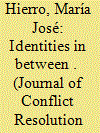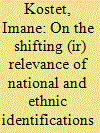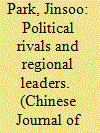| Srl | Item |
| 1 |
ID:
160494


|
|
|
|
|
| Summary/Abstract |
This article examines how political conflict shapes ethnonational identities in contexts where a national group coexists with territorially concentrated ethnic minorities and qualifies the view that conflict polarizes identities. An often overlooked fact is that large numbers of citizens in these contexts identify simultaneously with both groups. Based on the research about cross-pressures, we claim that dual identifiers react differently to conflict than exclusive identifiers. We predict that political disputes harden and polarize identities, but only among citizens at the extremes. Heightened conflict should not alter the identity of dual identifiers, but lead them to withdraw from politics. The setting of our study is Catalonia, a territory with numerous dual identifiers and an intense nonviolent political conflict. Results from two survey experiments, qualitative interviews, and public opinion surveys confirm that heightened political conflict only produces polarization at the extremes, but dual identifiers do not exhibit this reaction. Our findings have implications for policy interventions, as they suggest that strengthening dual identities may assuage the polarizing effects of conflict.
|
|
|
|
|
|
|
|
|
|
|
|
|
|
|
|
| 2 |
ID:
190767


|
|
|
|
|
| Summary/Abstract |
Based on three rounds of in-depth interviews, this article discusses the various ways in which children negotiate ethnic and national identities in a majority-minority city. I examine which identity labels children identify with, which relevance they attach to those labels, how they define these inclusively or exclusively and what these labels reveal about their senses of belonging. Children negotiate identity in myriad and creative ways and, while doing so, challenge public and political discourses by creating inclusive categories which transcend ethnic or national boundaries. I further show how, approximately 20 months after the first research round, the children retrospectively reflect on their self-identifications, may alter their initially chosen identity labels, and critically question the importance they once attached to those identities. The results contribute to a deeper understanding of children’s reflexivity and agency while dealing with their identity in a super-diverse environment.
|
|
|
|
|
|
|
|
|
|
|
|
|
|
|
|
| 3 |
ID:
120152


|
|
|
|
|
| Publication |
2013.
|
| Summary/Abstract |
This article argues that the dual identities of political rivals and regional leaders have been of critical importance in determining China and Japan's regional policies and their bilateral relations within East Asian cooperation. China and Japan, in identifying each other as political rivals rather than cooperative partners, have defined their interests in regional cooperative projects, particularly those led by the other party, in terms of power politics. At the same time, China and Japan's efforts to gain followers' acceptance of their aspired leadership identities have shaped their regional policy options and behaviours. The combination effects of these dual identities have produced variances in China and Japan's regional policies and their bilateral relations within East Asian financial and institutional cooperation. Particularly with regards to regional projects led by the other party and supported by a majority of followers, China and Japan cooperated with the intention of neutralizing the other's dominance in the region and to demonstrate the responsibilities one should assume as aspirant regional leader. China or Japan opposed, in terms of power politics, cooperative projects the other party initiated that did not secure majority support among followers, instead promoting their own initiatives to expand followers' acceptance of their leadership.
|
|
|
|
|
|
|
|
|
|
|
|
|
|
|
|